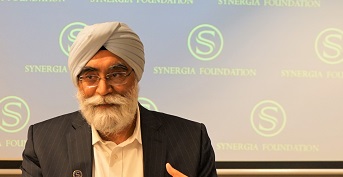Future of Banking in India
February 28, 2019 | Expert Insights

Synergia Foundation hosted its 50th roundtable conference on Monday, February 25, 2019 on the topic -The Future of Banking. The conference was led by the keynote speaker Dr. Charan Singh who is presently the Chief Executive of EGROW, Foundation for Economic Growth and Welfare. He is also serving as the Non-Executive Chairman of Punjab & Sind Bank.
Background
India’s banking industry has been a growing worry for both the government and industry. On one hand, the crisis of non-performing assets has impeded the industry’s ability to keep economic momentum, and on the other, dissonance in technological capability and payment systems has further complicated an already complex landscape. The reform of India’s banking sector has been the talking point of many governments, but none have so far been able to effectively address the key issues, especially of toxic assets.
What the Indian banking industry—projected to be the third largest by 2050—needs, is bold reform and a reshaping of its digital backbone. Indian PSUs presently need regular capital infusions and the reforms could be aimed at self-sustenance to prevent unsolicited mergers to ensure that the banking sector remains competitive.
Analysis
Dr. Charan Singh, the key discussant at the conference spoke about the various issues plaguing the Indian banking system. He elucidated on the history of Indian banks before addressing the topic on hand.
Dr. Singh emphasized the need for a rethink on the application of Basel norms in India. The Basel norms that have been established to govern banks around the world, foster cooperation among central banks with a common objective of fiscal stability and common standards of banking regulations.
According to Dr. Singh, Banking and Technology will become inseparable in the future and he felt that banking is expected to rely more on domestic financial technology (FinTech) companies coupled with sectoral reforms targeted at reducing bad-debt generation. Insurance, banking and wealth management will use artificial intelligence and robotics to reduce the need for manpower. “In view of the heightened usage of technology, the probability of frauds is likely to increase. Therefore, vigilance and firewalls will have to be enhanced” he remarked.
Banking through the phone and internet has replaced the need to visit banks. Digital banks have thus improved the convenience of banking. WhatsApp and Unified Payment Interface (UPI) are coming together to change payment mechanisms leading to an increase in banking penetration.
The enhanced banking penetration and higher number of digital transactions will aid the government with additional market intelligence and will also improve tax collection. Dr. Singh feels that a digital banking system could lead to less tax avoidance as all the transactions will be carried out online.
Bank merger deals have become quite common over the past few years. Dr. Singh claims that there is a need for another round of bank mergers in India. The acquisition of smaller banks by the bigger privately-owned banks will lead to the formation of 3-4 large entities who will be able to compete internationally with global banks.
In his speech, Dr. Singh highlighted the following:
• Strongly advocated that commercial banks should be divided into three categories – Internationally active (IA), Aiming to internationally active (AIA) and Domestically active (DA). He felt that Basel norms should be applied to IA banks and not applied to DA banks.
• He felt the need to establish a New Delhi – Mumbai norm where ownership resides with the public sector banks but is professionally regulated.
• He remarked that to finance larger number of infrastructure projects, there is a need to set up infrastructure banks that will remove pressure from commercial banks.
He concluded by saying that there is an urgent need for more research on banking in India. Research can help build a road map to help determine the future. There could also be a requirement for different benchmarks in Public Sector Banks due to the social role they play in India.
Counterpoint
Private Sector:
The conference mostly centred on PSU banks and the application of Basel norms in India. Although banks in the private sector are unable to break into rural areas, they have managed to control most of India’s urban spaces by means of better management practices, use of technology and competitive outlooks.
Assessment
Our assessment is that the nature of banking will evolve in the coming years with increased digitization and increased risk. We feel that the suggestions made by Dr. Singh on having different Basel norm guidelines for different classes of banks is to be considered.








Comments